Report on Organisational Behaviour: Culture, Power, and Politics
VerifiedAdded on 2022/12/28
|15
|5291
|33
Report
AI Summary
This report provides a comprehensive analysis of organisational behaviour, focusing on the influence of culture, power, and politics on individual and team dynamics. It examines how these factors impact employee behaviour and performance within the context of a case study on Body Shop. The report explores various motivation theories, including content and process theories, and their application in fostering effective teams. It further delves into the concepts of effective and ineffective teams, team development theories, and the application of organisational behaviour philosophies. The analysis includes an evaluation of the relationships between power, politics, culture, and motivation, and how these elements contribute to workplace behaviour. The report concludes with a critical analysis of team development theories and concepts influencing behaviour in the workplace.
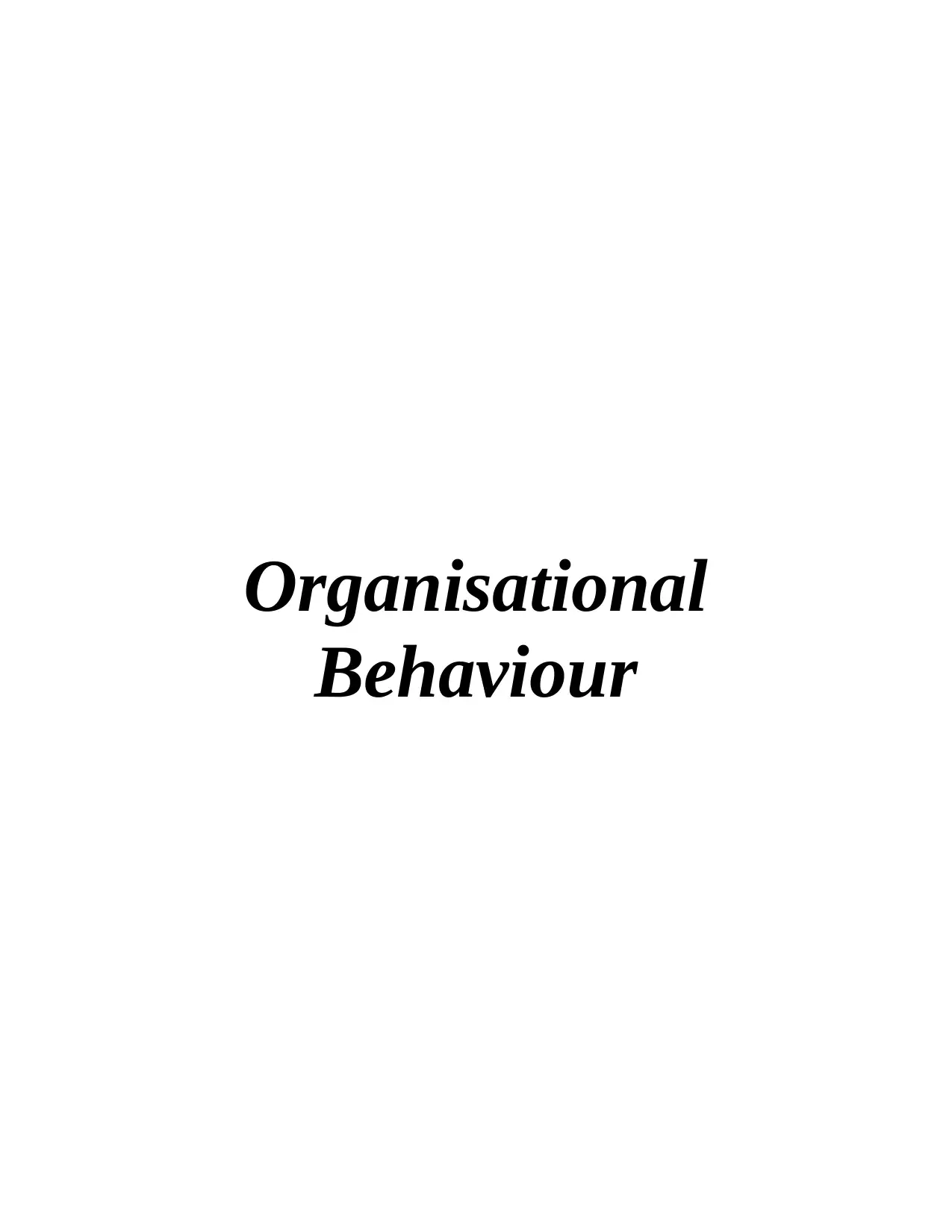
Organisational
Behaviour
Behaviour
Paraphrase This Document
Need a fresh take? Get an instant paraphrase of this document with our AI Paraphraser
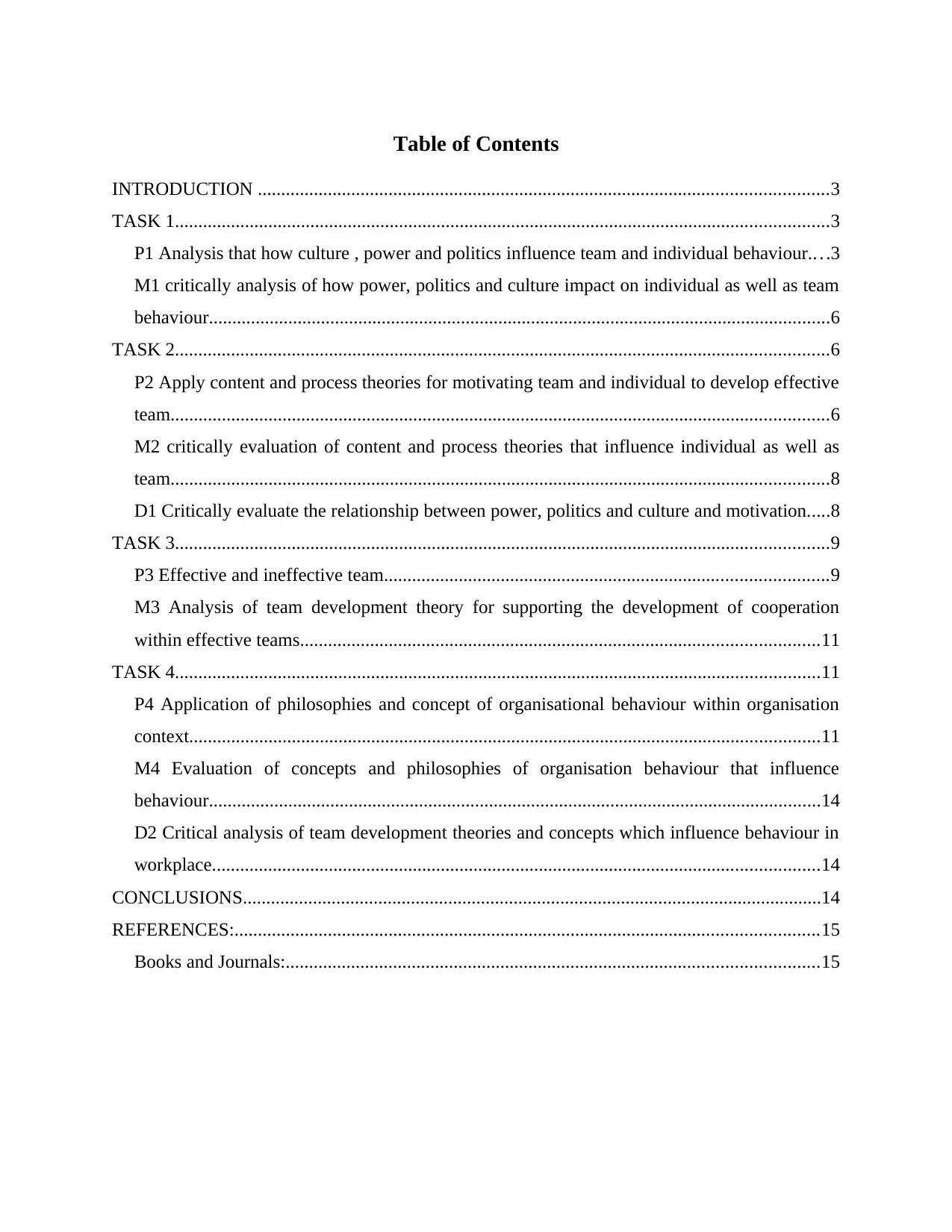
Table of Contents
INTRODUCTION ..........................................................................................................................3
TASK 1............................................................................................................................................3
P1 Analysis that how culture , power and politics influence team and individual behaviour.. . .3
M1 critically analysis of how power, politics and culture impact on individual as well as team
behaviour.....................................................................................................................................6
TASK 2............................................................................................................................................6
P2 Apply content and process theories for motivating team and individual to develop effective
team.............................................................................................................................................6
M2 critically evaluation of content and process theories that influence individual as well as
team.............................................................................................................................................8
D1 Critically evaluate the relationship between power, politics and culture and motivation.....8
TASK 3............................................................................................................................................9
P3 Effective and ineffective team...............................................................................................9
M3 Analysis of team development theory for supporting the development of cooperation
within effective teams...............................................................................................................11
TASK 4..........................................................................................................................................11
P4 Application of philosophies and concept of organisational behaviour within organisation
context.......................................................................................................................................11
M4 Evaluation of concepts and philosophies of organisation behaviour that influence
behaviour...................................................................................................................................14
D2 Critical analysis of team development theories and concepts which influence behaviour in
workplace..................................................................................................................................14
CONCLUSIONS............................................................................................................................14
REFERENCES:.............................................................................................................................15
Books and Journals:..................................................................................................................15
INTRODUCTION ..........................................................................................................................3
TASK 1............................................................................................................................................3
P1 Analysis that how culture , power and politics influence team and individual behaviour.. . .3
M1 critically analysis of how power, politics and culture impact on individual as well as team
behaviour.....................................................................................................................................6
TASK 2............................................................................................................................................6
P2 Apply content and process theories for motivating team and individual to develop effective
team.............................................................................................................................................6
M2 critically evaluation of content and process theories that influence individual as well as
team.............................................................................................................................................8
D1 Critically evaluate the relationship between power, politics and culture and motivation.....8
TASK 3............................................................................................................................................9
P3 Effective and ineffective team...............................................................................................9
M3 Analysis of team development theory for supporting the development of cooperation
within effective teams...............................................................................................................11
TASK 4..........................................................................................................................................11
P4 Application of philosophies and concept of organisational behaviour within organisation
context.......................................................................................................................................11
M4 Evaluation of concepts and philosophies of organisation behaviour that influence
behaviour...................................................................................................................................14
D2 Critical analysis of team development theories and concepts which influence behaviour in
workplace..................................................................................................................................14
CONCLUSIONS............................................................................................................................14
REFERENCES:.............................................................................................................................15
Books and Journals:..................................................................................................................15
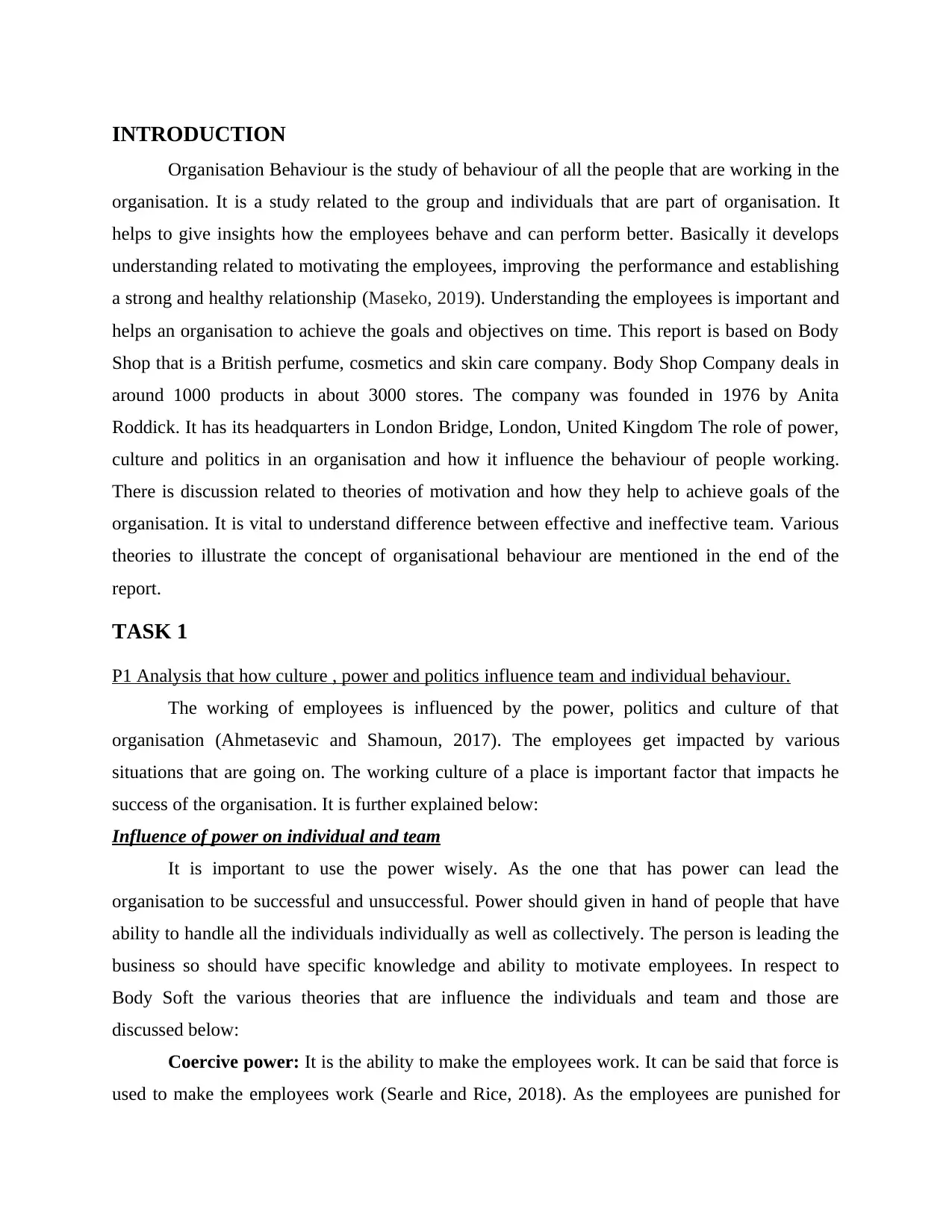
INTRODUCTION
Organisation Behaviour is the study of behaviour of all the people that are working in the
organisation. It is a study related to the group and individuals that are part of organisation. It
helps to give insights how the employees behave and can perform better. Basically it develops
understanding related to motivating the employees, improving the performance and establishing
a strong and healthy relationship (Maseko, 2019). Understanding the employees is important and
helps an organisation to achieve the goals and objectives on time. This report is based on Body
Shop that is a British perfume, cosmetics and skin care company. Body Shop Company deals in
around 1000 products in about 3000 stores. The company was founded in 1976 by Anita
Roddick. It has its headquarters in London Bridge, London, United Kingdom The role of power,
culture and politics in an organisation and how it influence the behaviour of people working.
There is discussion related to theories of motivation and how they help to achieve goals of the
organisation. It is vital to understand difference between effective and ineffective team. Various
theories to illustrate the concept of organisational behaviour are mentioned in the end of the
report.
TASK 1
P1 Analysis that how culture , power and politics influence team and individual behaviour.
The working of employees is influenced by the power, politics and culture of that
organisation (Ahmetasevic and Shamoun, 2017). The employees get impacted by various
situations that are going on. The working culture of a place is important factor that impacts he
success of the organisation. It is further explained below:
Influence of power on individual and team
It is important to use the power wisely. As the one that has power can lead the
organisation to be successful and unsuccessful. Power should given in hand of people that have
ability to handle all the individuals individually as well as collectively. The person is leading the
business so should have specific knowledge and ability to motivate employees. In respect to
Body Soft the various theories that are influence the individuals and team and those are
discussed below:
Coercive power: It is the ability to make the employees work. It can be said that force is
used to make the employees work (Searle and Rice, 2018). As the employees are punished for
Organisation Behaviour is the study of behaviour of all the people that are working in the
organisation. It is a study related to the group and individuals that are part of organisation. It
helps to give insights how the employees behave and can perform better. Basically it develops
understanding related to motivating the employees, improving the performance and establishing
a strong and healthy relationship (Maseko, 2019). Understanding the employees is important and
helps an organisation to achieve the goals and objectives on time. This report is based on Body
Shop that is a British perfume, cosmetics and skin care company. Body Shop Company deals in
around 1000 products in about 3000 stores. The company was founded in 1976 by Anita
Roddick. It has its headquarters in London Bridge, London, United Kingdom The role of power,
culture and politics in an organisation and how it influence the behaviour of people working.
There is discussion related to theories of motivation and how they help to achieve goals of the
organisation. It is vital to understand difference between effective and ineffective team. Various
theories to illustrate the concept of organisational behaviour are mentioned in the end of the
report.
TASK 1
P1 Analysis that how culture , power and politics influence team and individual behaviour.
The working of employees is influenced by the power, politics and culture of that
organisation (Ahmetasevic and Shamoun, 2017). The employees get impacted by various
situations that are going on. The working culture of a place is important factor that impacts he
success of the organisation. It is further explained below:
Influence of power on individual and team
It is important to use the power wisely. As the one that has power can lead the
organisation to be successful and unsuccessful. Power should given in hand of people that have
ability to handle all the individuals individually as well as collectively. The person is leading the
business so should have specific knowledge and ability to motivate employees. In respect to
Body Soft the various theories that are influence the individuals and team and those are
discussed below:
Coercive power: It is the ability to make the employees work. It can be said that force is
used to make the employees work (Searle and Rice, 2018). As the employees are punished for
⊘ This is a preview!⊘
Do you want full access?
Subscribe today to unlock all pages.

Trusted by 1+ million students worldwide
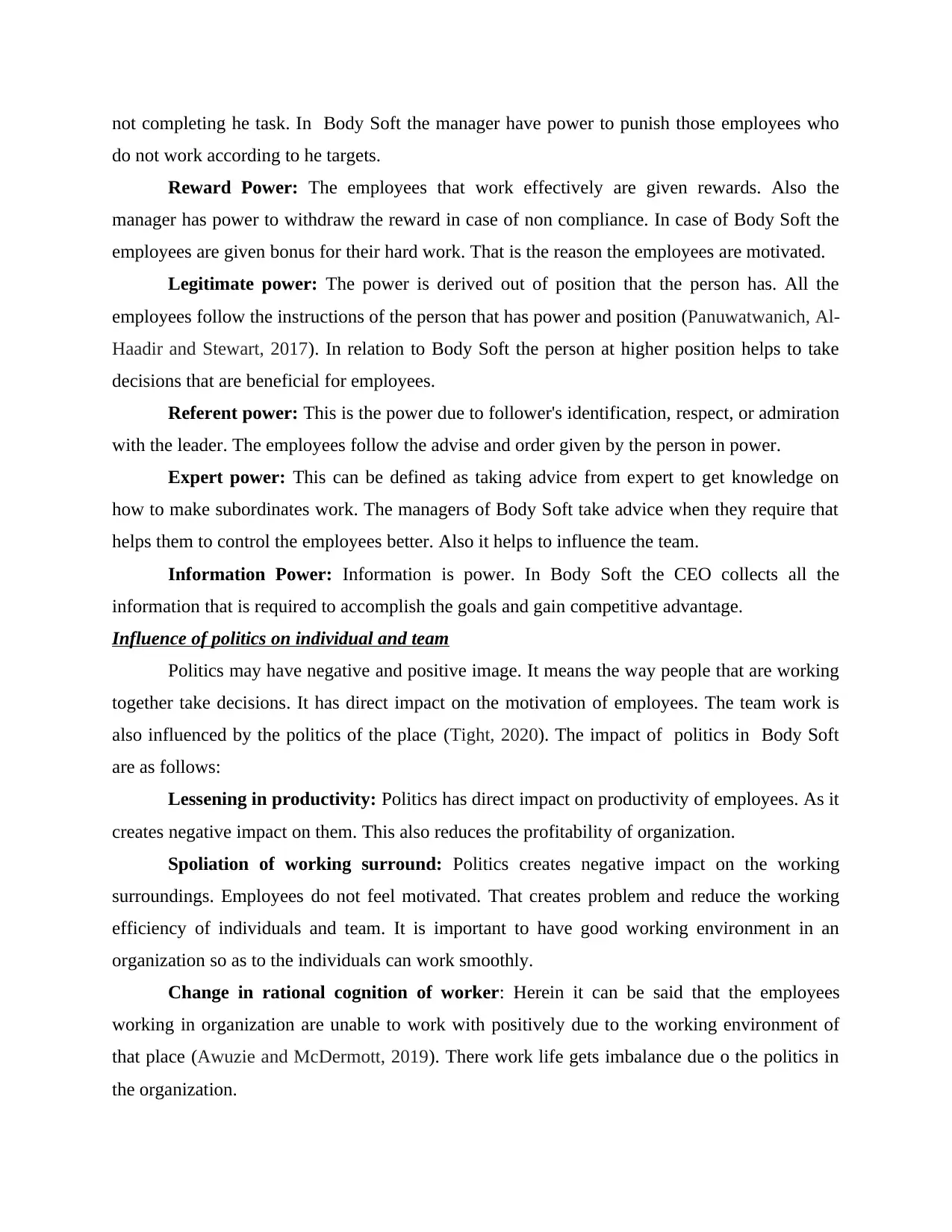
not completing he task. In Body Soft the manager have power to punish those employees who
do not work according to he targets.
Reward Power: The employees that work effectively are given rewards. Also the
manager has power to withdraw the reward in case of non compliance. In case of Body Soft the
employees are given bonus for their hard work. That is the reason the employees are motivated.
Legitimate power: The power is derived out of position that the person has. All the
employees follow the instructions of the person that has power and position (Panuwatwanich, Al-
Haadir and Stewart, 2017). In relation to Body Soft the person at higher position helps to take
decisions that are beneficial for employees.
Referent power: This is the power due to follower's identification, respect, or admiration
with the leader. The employees follow the advise and order given by the person in power.
Expert power: This can be defined as taking advice from expert to get knowledge on
how to make subordinates work. The managers of Body Soft take advice when they require that
helps them to control the employees better. Also it helps to influence the team.
Information Power: Information is power. In Body Soft the CEO collects all the
information that is required to accomplish the goals and gain competitive advantage.
Influence of politics on individual and team
Politics may have negative and positive image. It means the way people that are working
together take decisions. It has direct impact on the motivation of employees. The team work is
also influenced by the politics of the place (Tight, 2020). The impact of politics in Body Soft
are as follows:
Lessening in productivity: Politics has direct impact on productivity of employees. As it
creates negative impact on them. This also reduces the profitability of organization.
Spoliation of working surround: Politics creates negative impact on the working
surroundings. Employees do not feel motivated. That creates problem and reduce the working
efficiency of individuals and team. It is important to have good working environment in an
organization so as to the individuals can work smoothly.
Change in rational cognition of worker: Herein it can be said that the employees
working in organization are unable to work with positively due to the working environment of
that place (Awuzie and McDermott, 2019). There work life gets imbalance due o the politics in
the organization.
do not work according to he targets.
Reward Power: The employees that work effectively are given rewards. Also the
manager has power to withdraw the reward in case of non compliance. In case of Body Soft the
employees are given bonus for their hard work. That is the reason the employees are motivated.
Legitimate power: The power is derived out of position that the person has. All the
employees follow the instructions of the person that has power and position (Panuwatwanich, Al-
Haadir and Stewart, 2017). In relation to Body Soft the person at higher position helps to take
decisions that are beneficial for employees.
Referent power: This is the power due to follower's identification, respect, or admiration
with the leader. The employees follow the advise and order given by the person in power.
Expert power: This can be defined as taking advice from expert to get knowledge on
how to make subordinates work. The managers of Body Soft take advice when they require that
helps them to control the employees better. Also it helps to influence the team.
Information Power: Information is power. In Body Soft the CEO collects all the
information that is required to accomplish the goals and gain competitive advantage.
Influence of politics on individual and team
Politics may have negative and positive image. It means the way people that are working
together take decisions. It has direct impact on the motivation of employees. The team work is
also influenced by the politics of the place (Tight, 2020). The impact of politics in Body Soft
are as follows:
Lessening in productivity: Politics has direct impact on productivity of employees. As it
creates negative impact on them. This also reduces the profitability of organization.
Spoliation of working surround: Politics creates negative impact on the working
surroundings. Employees do not feel motivated. That creates problem and reduce the working
efficiency of individuals and team. It is important to have good working environment in an
organization so as to the individuals can work smoothly.
Change in rational cognition of worker: Herein it can be said that the employees
working in organization are unable to work with positively due to the working environment of
that place (Awuzie and McDermott, 2019). There work life gets imbalance due o the politics in
the organization.
Paraphrase This Document
Need a fresh take? Get an instant paraphrase of this document with our AI Paraphraser
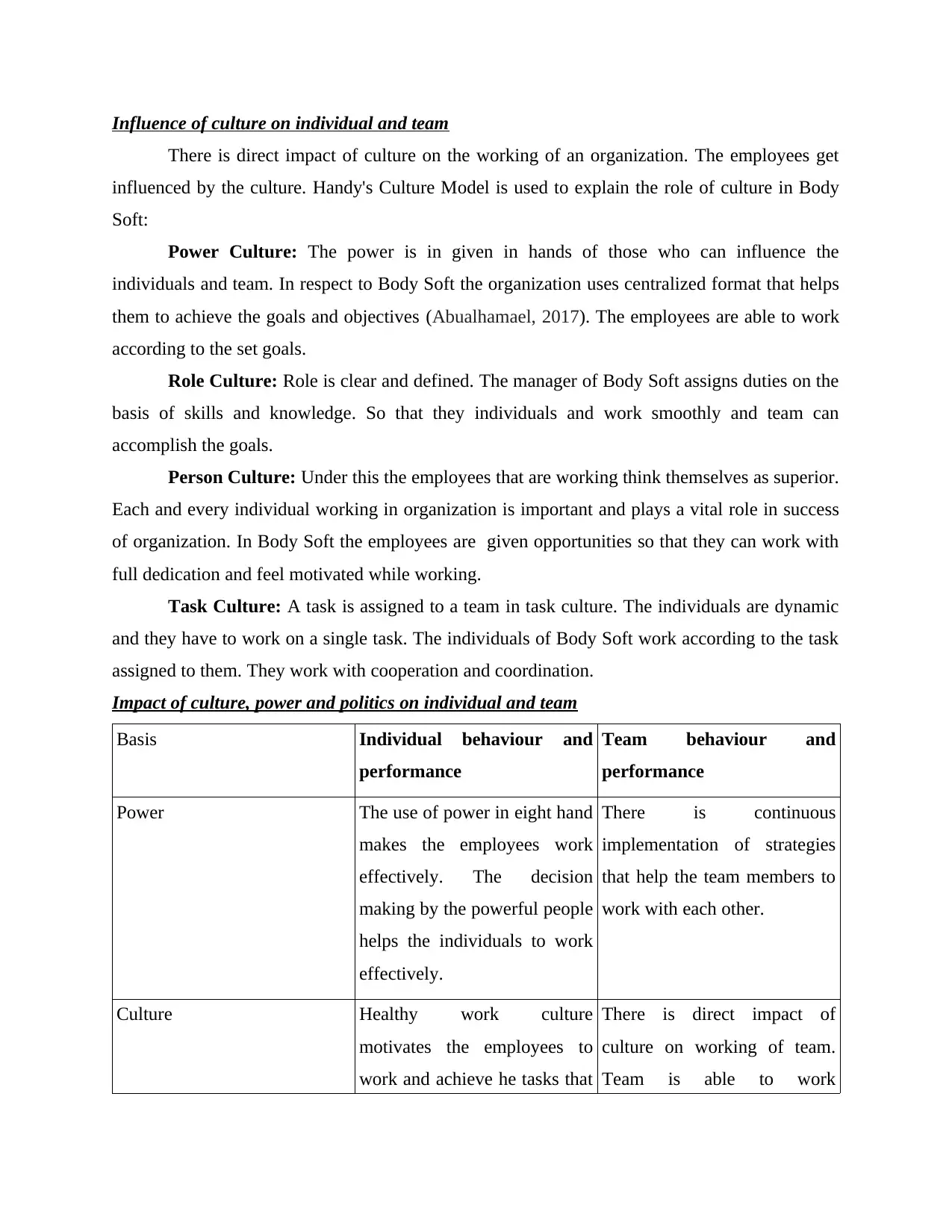
Influence of culture on individual and team
There is direct impact of culture on the working of an organization. The employees get
influenced by the culture. Handy's Culture Model is used to explain the role of culture in Body
Soft:
Power Culture: The power is in given in hands of those who can influence the
individuals and team. In respect to Body Soft the organization uses centralized format that helps
them to achieve the goals and objectives (Abualhamael, 2017). The employees are able to work
according to the set goals.
Role Culture: Role is clear and defined. The manager of Body Soft assigns duties on the
basis of skills and knowledge. So that they individuals and work smoothly and team can
accomplish the goals.
Person Culture: Under this the employees that are working think themselves as superior.
Each and every individual working in organization is important and plays a vital role in success
of organization. In Body Soft the employees are given opportunities so that they can work with
full dedication and feel motivated while working.
Task Culture: A task is assigned to a team in task culture. The individuals are dynamic
and they have to work on a single task. The individuals of Body Soft work according to the task
assigned to them. They work with cooperation and coordination.
Impact of culture, power and politics on individual and team
Basis Individual behaviour and
performance
Team behaviour and
performance
Power The use of power in eight hand
makes the employees work
effectively. The decision
making by the powerful people
helps the individuals to work
effectively.
There is continuous
implementation of strategies
that help the team members to
work with each other.
Culture Healthy work culture
motivates the employees to
work and achieve he tasks that
There is direct impact of
culture on working of team.
Team is able to work
There is direct impact of culture on the working of an organization. The employees get
influenced by the culture. Handy's Culture Model is used to explain the role of culture in Body
Soft:
Power Culture: The power is in given in hands of those who can influence the
individuals and team. In respect to Body Soft the organization uses centralized format that helps
them to achieve the goals and objectives (Abualhamael, 2017). The employees are able to work
according to the set goals.
Role Culture: Role is clear and defined. The manager of Body Soft assigns duties on the
basis of skills and knowledge. So that they individuals and work smoothly and team can
accomplish the goals.
Person Culture: Under this the employees that are working think themselves as superior.
Each and every individual working in organization is important and plays a vital role in success
of organization. In Body Soft the employees are given opportunities so that they can work with
full dedication and feel motivated while working.
Task Culture: A task is assigned to a team in task culture. The individuals are dynamic
and they have to work on a single task. The individuals of Body Soft work according to the task
assigned to them. They work with cooperation and coordination.
Impact of culture, power and politics on individual and team
Basis Individual behaviour and
performance
Team behaviour and
performance
Power The use of power in eight hand
makes the employees work
effectively. The decision
making by the powerful people
helps the individuals to work
effectively.
There is continuous
implementation of strategies
that help the team members to
work with each other.
Culture Healthy work culture
motivates the employees to
work and achieve he tasks that
There is direct impact of
culture on working of team.
Team is able to work
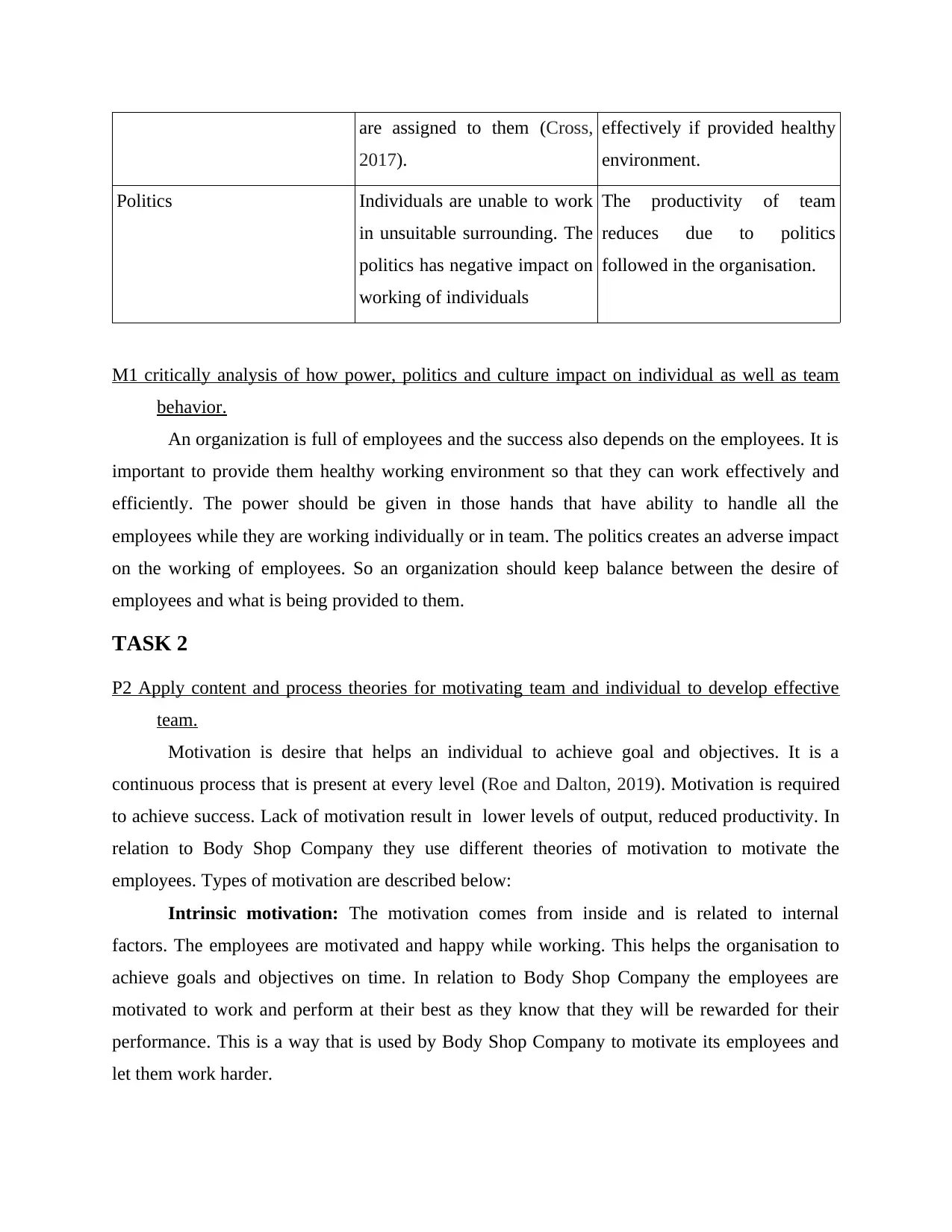
are assigned to them (Cross,
2017).
effectively if provided healthy
environment.
Politics Individuals are unable to work
in unsuitable surrounding. The
politics has negative impact on
working of individuals
The productivity of team
reduces due to politics
followed in the organisation.
M1 critically analysis of how power, politics and culture impact on individual as well as team
behavior.
An organization is full of employees and the success also depends on the employees. It is
important to provide them healthy working environment so that they can work effectively and
efficiently. The power should be given in those hands that have ability to handle all the
employees while they are working individually or in team. The politics creates an adverse impact
on the working of employees. So an organization should keep balance between the desire of
employees and what is being provided to them.
TASK 2
P2 Apply content and process theories for motivating team and individual to develop effective
team.
Motivation is desire that helps an individual to achieve goal and objectives. It is a
continuous process that is present at every level (Roe and Dalton, 2019). Motivation is required
to achieve success. Lack of motivation result in lower levels of output, reduced productivity. In
relation to Body Shop Company they use different theories of motivation to motivate the
employees. Types of motivation are described below:
Intrinsic motivation: The motivation comes from inside and is related to internal
factors. The employees are motivated and happy while working. This helps the organisation to
achieve goals and objectives on time. In relation to Body Shop Company the employees are
motivated to work and perform at their best as they know that they will be rewarded for their
performance. This is a way that is used by Body Shop Company to motivate its employees and
let them work harder.
2017).
effectively if provided healthy
environment.
Politics Individuals are unable to work
in unsuitable surrounding. The
politics has negative impact on
working of individuals
The productivity of team
reduces due to politics
followed in the organisation.
M1 critically analysis of how power, politics and culture impact on individual as well as team
behavior.
An organization is full of employees and the success also depends on the employees. It is
important to provide them healthy working environment so that they can work effectively and
efficiently. The power should be given in those hands that have ability to handle all the
employees while they are working individually or in team. The politics creates an adverse impact
on the working of employees. So an organization should keep balance between the desire of
employees and what is being provided to them.
TASK 2
P2 Apply content and process theories for motivating team and individual to develop effective
team.
Motivation is desire that helps an individual to achieve goal and objectives. It is a
continuous process that is present at every level (Roe and Dalton, 2019). Motivation is required
to achieve success. Lack of motivation result in lower levels of output, reduced productivity. In
relation to Body Shop Company they use different theories of motivation to motivate the
employees. Types of motivation are described below:
Intrinsic motivation: The motivation comes from inside and is related to internal
factors. The employees are motivated and happy while working. This helps the organisation to
achieve goals and objectives on time. In relation to Body Shop Company the employees are
motivated to work and perform at their best as they know that they will be rewarded for their
performance. This is a way that is used by Body Shop Company to motivate its employees and
let them work harder.
⊘ This is a preview!⊘
Do you want full access?
Subscribe today to unlock all pages.

Trusted by 1+ million students worldwide
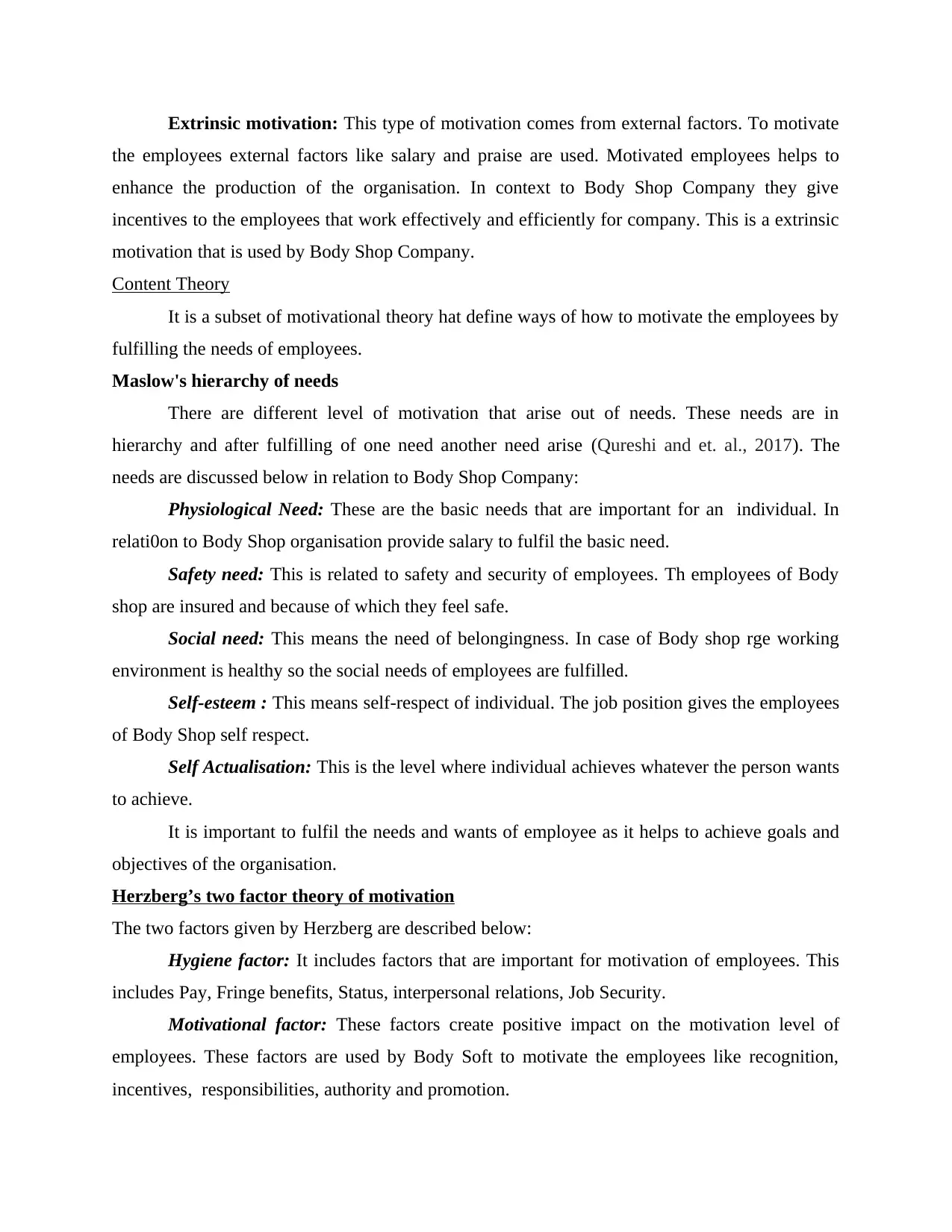
Extrinsic motivation: This type of motivation comes from external factors. To motivate
the employees external factors like salary and praise are used. Motivated employees helps to
enhance the production of the organisation. In context to Body Shop Company they give
incentives to the employees that work effectively and efficiently for company. This is a extrinsic
motivation that is used by Body Shop Company.
Content Theory
It is a subset of motivational theory hat define ways of how to motivate the employees by
fulfilling the needs of employees.
Maslow's hierarchy of needs
There are different level of motivation that arise out of needs. These needs are in
hierarchy and after fulfilling of one need another need arise (Qureshi and et. al., 2017). The
needs are discussed below in relation to Body Shop Company:
Physiological Need: These are the basic needs that are important for an individual. In
relati0on to Body Shop organisation provide salary to fulfil the basic need.
Safety need: This is related to safety and security of employees. Th employees of Body
shop are insured and because of which they feel safe.
Social need: This means the need of belongingness. In case of Body shop rge working
environment is healthy so the social needs of employees are fulfilled.
Self-esteem : This means self-respect of individual. The job position gives the employees
of Body Shop self respect.
Self Actualisation: This is the level where individual achieves whatever the person wants
to achieve.
It is important to fulfil the needs and wants of employee as it helps to achieve goals and
objectives of the organisation.
Herzberg’s two factor theory of motivation
The two factors given by Herzberg are described below:
Hygiene factor: It includes factors that are important for motivation of employees. This
includes Pay, Fringe benefits, Status, interpersonal relations, Job Security.
Motivational factor: These factors create positive impact on the motivation level of
employees. These factors are used by Body Soft to motivate the employees like recognition,
incentives, responsibilities, authority and promotion.
the employees external factors like salary and praise are used. Motivated employees helps to
enhance the production of the organisation. In context to Body Shop Company they give
incentives to the employees that work effectively and efficiently for company. This is a extrinsic
motivation that is used by Body Shop Company.
Content Theory
It is a subset of motivational theory hat define ways of how to motivate the employees by
fulfilling the needs of employees.
Maslow's hierarchy of needs
There are different level of motivation that arise out of needs. These needs are in
hierarchy and after fulfilling of one need another need arise (Qureshi and et. al., 2017). The
needs are discussed below in relation to Body Shop Company:
Physiological Need: These are the basic needs that are important for an individual. In
relati0on to Body Shop organisation provide salary to fulfil the basic need.
Safety need: This is related to safety and security of employees. Th employees of Body
shop are insured and because of which they feel safe.
Social need: This means the need of belongingness. In case of Body shop rge working
environment is healthy so the social needs of employees are fulfilled.
Self-esteem : This means self-respect of individual. The job position gives the employees
of Body Shop self respect.
Self Actualisation: This is the level where individual achieves whatever the person wants
to achieve.
It is important to fulfil the needs and wants of employee as it helps to achieve goals and
objectives of the organisation.
Herzberg’s two factor theory of motivation
The two factors given by Herzberg are described below:
Hygiene factor: It includes factors that are important for motivation of employees. This
includes Pay, Fringe benefits, Status, interpersonal relations, Job Security.
Motivational factor: These factors create positive impact on the motivation level of
employees. These factors are used by Body Soft to motivate the employees like recognition,
incentives, responsibilities, authority and promotion.
Paraphrase This Document
Need a fresh take? Get an instant paraphrase of this document with our AI Paraphraser
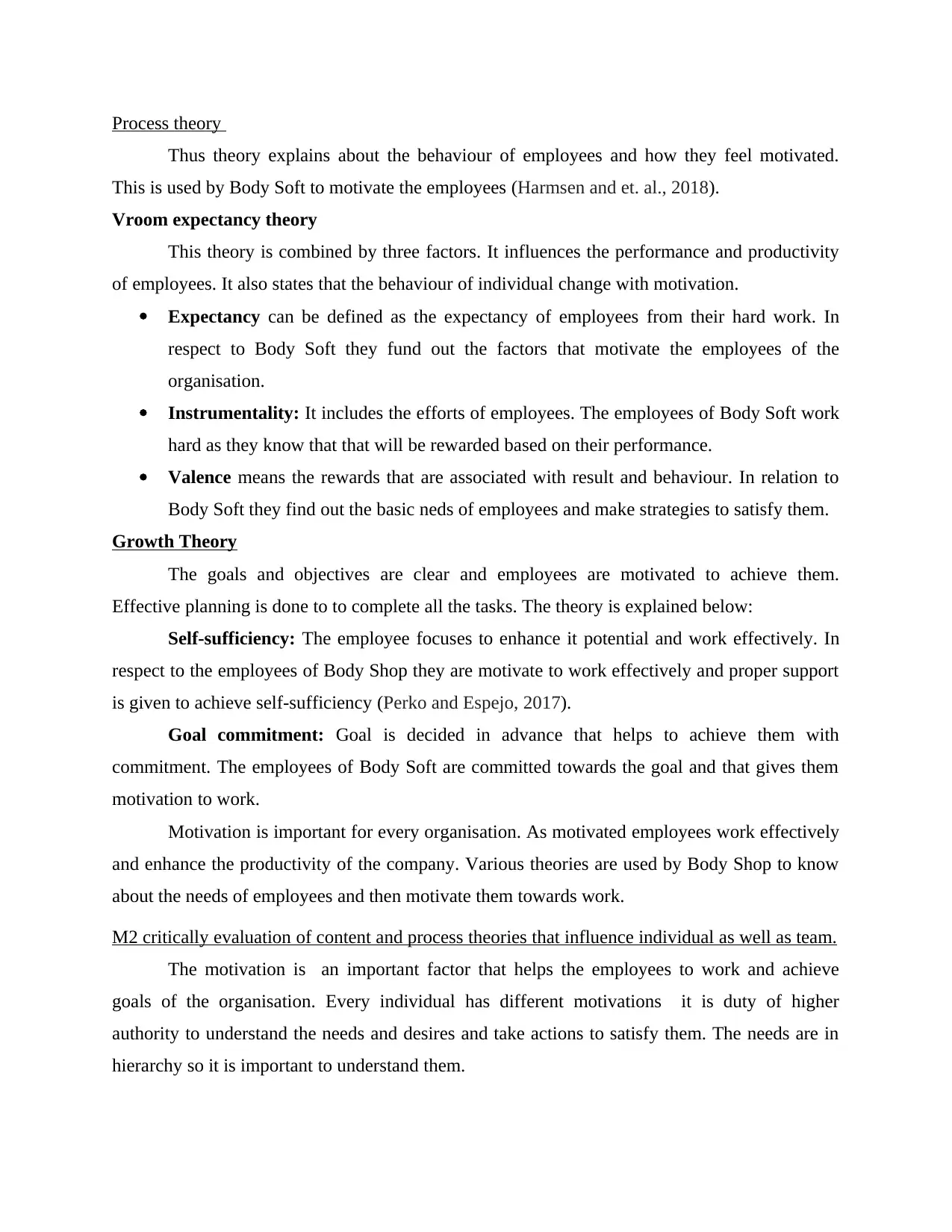
Process theory
Thus theory explains about the behaviour of employees and how they feel motivated.
This is used by Body Soft to motivate the employees (Harmsen and et. al., 2018).
Vroom expectancy theory
This theory is combined by three factors. It influences the performance and productivity
of employees. It also states that the behaviour of individual change with motivation.
Expectancy can be defined as the expectancy of employees from their hard work. In
respect to Body Soft they fund out the factors that motivate the employees of the
organisation.
Instrumentality: It includes the efforts of employees. The employees of Body Soft work
hard as they know that that will be rewarded based on their performance.
Valence means the rewards that are associated with result and behaviour. In relation to
Body Soft they find out the basic neds of employees and make strategies to satisfy them.
Growth Theory
The goals and objectives are clear and employees are motivated to achieve them.
Effective planning is done to to complete all the tasks. The theory is explained below:
Self-sufficiency: The employee focuses to enhance it potential and work effectively. In
respect to the employees of Body Shop they are motivate to work effectively and proper support
is given to achieve self-sufficiency (Perko and Espejo, 2017).
Goal commitment: Goal is decided in advance that helps to achieve them with
commitment. The employees of Body Soft are committed towards the goal and that gives them
motivation to work.
Motivation is important for every organisation. As motivated employees work effectively
and enhance the productivity of the company. Various theories are used by Body Shop to know
about the needs of employees and then motivate them towards work.
M2 critically evaluation of content and process theories that influence individual as well as team.
The motivation is an important factor that helps the employees to work and achieve
goals of the organisation. Every individual has different motivations it is duty of higher
authority to understand the needs and desires and take actions to satisfy them. The needs are in
hierarchy so it is important to understand them.
Thus theory explains about the behaviour of employees and how they feel motivated.
This is used by Body Soft to motivate the employees (Harmsen and et. al., 2018).
Vroom expectancy theory
This theory is combined by three factors. It influences the performance and productivity
of employees. It also states that the behaviour of individual change with motivation.
Expectancy can be defined as the expectancy of employees from their hard work. In
respect to Body Soft they fund out the factors that motivate the employees of the
organisation.
Instrumentality: It includes the efforts of employees. The employees of Body Soft work
hard as they know that that will be rewarded based on their performance.
Valence means the rewards that are associated with result and behaviour. In relation to
Body Soft they find out the basic neds of employees and make strategies to satisfy them.
Growth Theory
The goals and objectives are clear and employees are motivated to achieve them.
Effective planning is done to to complete all the tasks. The theory is explained below:
Self-sufficiency: The employee focuses to enhance it potential and work effectively. In
respect to the employees of Body Shop they are motivate to work effectively and proper support
is given to achieve self-sufficiency (Perko and Espejo, 2017).
Goal commitment: Goal is decided in advance that helps to achieve them with
commitment. The employees of Body Soft are committed towards the goal and that gives them
motivation to work.
Motivation is important for every organisation. As motivated employees work effectively
and enhance the productivity of the company. Various theories are used by Body Shop to know
about the needs of employees and then motivate them towards work.
M2 critically evaluation of content and process theories that influence individual as well as team.
The motivation is an important factor that helps the employees to work and achieve
goals of the organisation. Every individual has different motivations it is duty of higher
authority to understand the needs and desires and take actions to satisfy them. The needs are in
hierarchy so it is important to understand them.
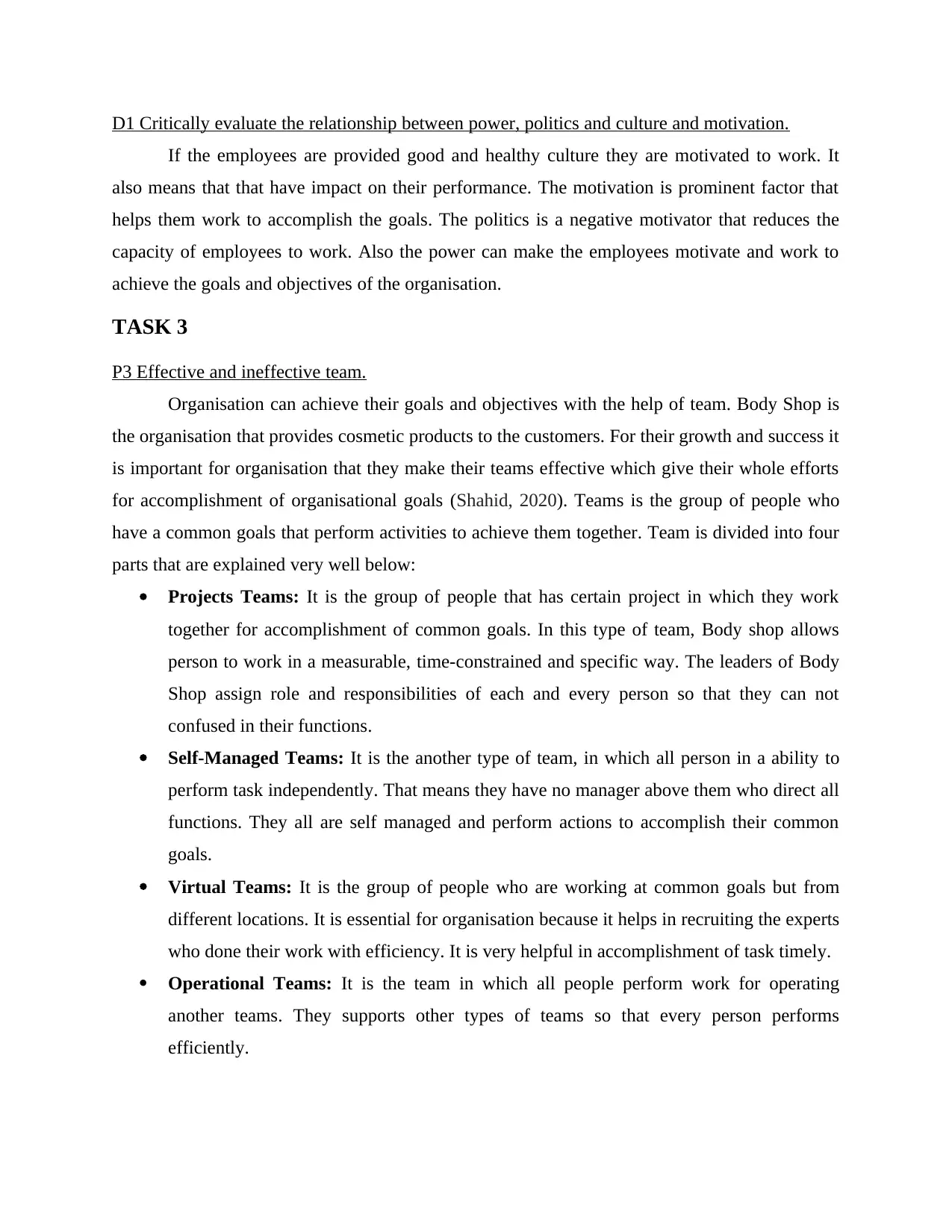
D1 Critically evaluate the relationship between power, politics and culture and motivation.
If the employees are provided good and healthy culture they are motivated to work. It
also means that that have impact on their performance. The motivation is prominent factor that
helps them work to accomplish the goals. The politics is a negative motivator that reduces the
capacity of employees to work. Also the power can make the employees motivate and work to
achieve the goals and objectives of the organisation.
TASK 3
P3 Effective and ineffective team.
Organisation can achieve their goals and objectives with the help of team. Body Shop is
the organisation that provides cosmetic products to the customers. For their growth and success it
is important for organisation that they make their teams effective which give their whole efforts
for accomplishment of organisational goals (Shahid, 2020). Teams is the group of people who
have a common goals that perform activities to achieve them together. Team is divided into four
parts that are explained very well below:
Projects Teams: It is the group of people that has certain project in which they work
together for accomplishment of common goals. In this type of team, Body shop allows
person to work in a measurable, time-constrained and specific way. The leaders of Body
Shop assign role and responsibilities of each and every person so that they can not
confused in their functions.
Self-Managed Teams: It is the another type of team, in which all person in a ability to
perform task independently. That means they have no manager above them who direct all
functions. They all are self managed and perform actions to accomplish their common
goals.
Virtual Teams: It is the group of people who are working at common goals but from
different locations. It is essential for organisation because it helps in recruiting the experts
who done their work with efficiency. It is very helpful in accomplishment of task timely.
Operational Teams: It is the team in which all people perform work for operating
another teams. They supports other types of teams so that every person performs
efficiently.
If the employees are provided good and healthy culture they are motivated to work. It
also means that that have impact on their performance. The motivation is prominent factor that
helps them work to accomplish the goals. The politics is a negative motivator that reduces the
capacity of employees to work. Also the power can make the employees motivate and work to
achieve the goals and objectives of the organisation.
TASK 3
P3 Effective and ineffective team.
Organisation can achieve their goals and objectives with the help of team. Body Shop is
the organisation that provides cosmetic products to the customers. For their growth and success it
is important for organisation that they make their teams effective which give their whole efforts
for accomplishment of organisational goals (Shahid, 2020). Teams is the group of people who
have a common goals that perform activities to achieve them together. Team is divided into four
parts that are explained very well below:
Projects Teams: It is the group of people that has certain project in which they work
together for accomplishment of common goals. In this type of team, Body shop allows
person to work in a measurable, time-constrained and specific way. The leaders of Body
Shop assign role and responsibilities of each and every person so that they can not
confused in their functions.
Self-Managed Teams: It is the another type of team, in which all person in a ability to
perform task independently. That means they have no manager above them who direct all
functions. They all are self managed and perform actions to accomplish their common
goals.
Virtual Teams: It is the group of people who are working at common goals but from
different locations. It is essential for organisation because it helps in recruiting the experts
who done their work with efficiency. It is very helpful in accomplishment of task timely.
Operational Teams: It is the team in which all people perform work for operating
another teams. They supports other types of teams so that every person performs
efficiently.
⊘ This is a preview!⊘
Do you want full access?
Subscribe today to unlock all pages.

Trusted by 1+ million students worldwide
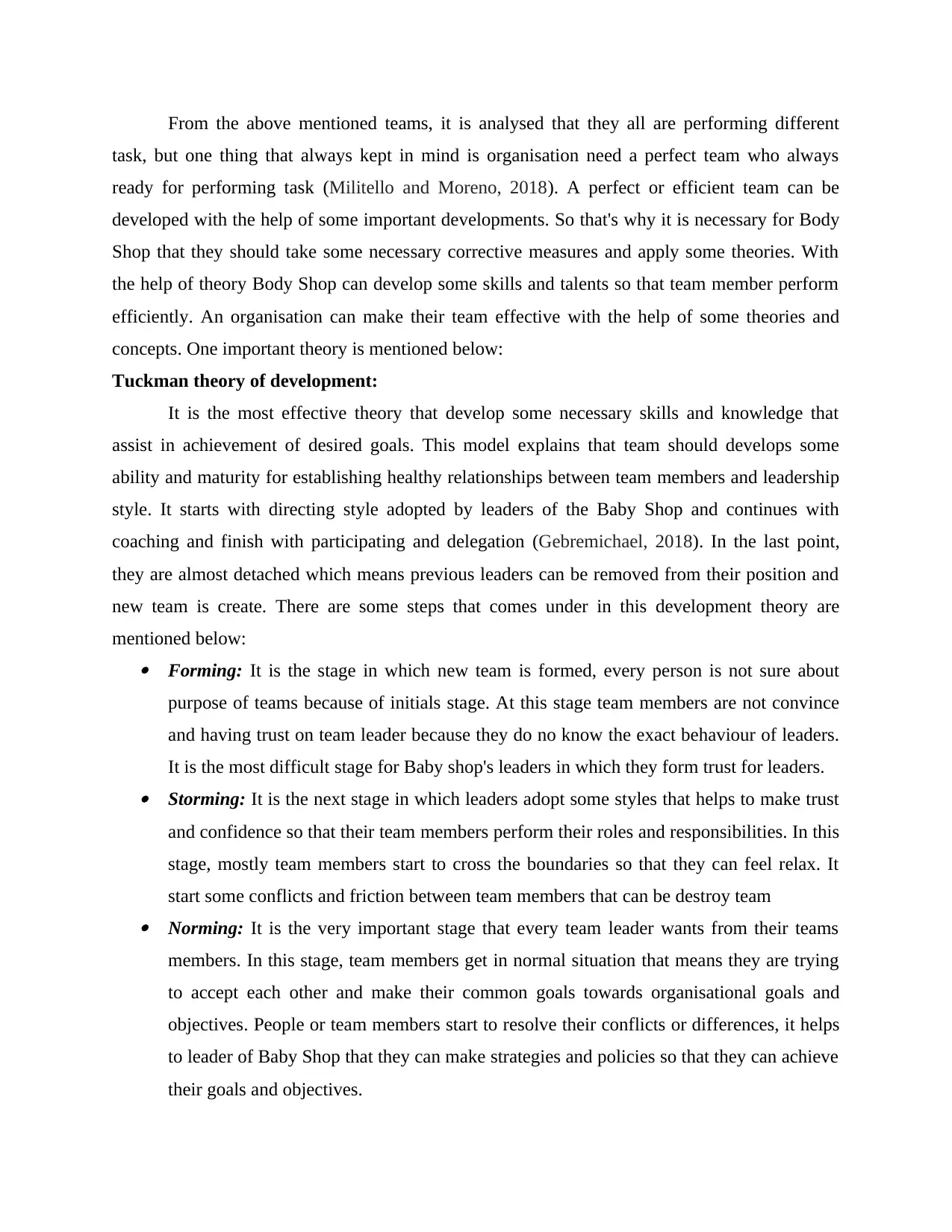
From the above mentioned teams, it is analysed that they all are performing different
task, but one thing that always kept in mind is organisation need a perfect team who always
ready for performing task (Militello and Moreno, 2018). A perfect or efficient team can be
developed with the help of some important developments. So that's why it is necessary for Body
Shop that they should take some necessary corrective measures and apply some theories. With
the help of theory Body Shop can develop some skills and talents so that team member perform
efficiently. An organisation can make their team effective with the help of some theories and
concepts. One important theory is mentioned below:
Tuckman theory of development:
It is the most effective theory that develop some necessary skills and knowledge that
assist in achievement of desired goals. This model explains that team should develops some
ability and maturity for establishing healthy relationships between team members and leadership
style. It starts with directing style adopted by leaders of the Baby Shop and continues with
coaching and finish with participating and delegation (Gebremichael, 2018). In the last point,
they are almost detached which means previous leaders can be removed from their position and
new team is create. There are some steps that comes under in this development theory are
mentioned below: Forming: It is the stage in which new team is formed, every person is not sure about
purpose of teams because of initials stage. At this stage team members are not convince
and having trust on team leader because they do no know the exact behaviour of leaders.
It is the most difficult stage for Baby shop's leaders in which they form trust for leaders. Storming: It is the next stage in which leaders adopt some styles that helps to make trust
and confidence so that their team members perform their roles and responsibilities. In this
stage, mostly team members start to cross the boundaries so that they can feel relax. It
start some conflicts and friction between team members that can be destroy team Norming: It is the very important stage that every team leader wants from their teams
members. In this stage, team members get in normal situation that means they are trying
to accept each other and make their common goals towards organisational goals and
objectives. People or team members start to resolve their conflicts or differences, it helps
to leader of Baby Shop that they can make strategies and policies so that they can achieve
their goals and objectives.
task, but one thing that always kept in mind is organisation need a perfect team who always
ready for performing task (Militello and Moreno, 2018). A perfect or efficient team can be
developed with the help of some important developments. So that's why it is necessary for Body
Shop that they should take some necessary corrective measures and apply some theories. With
the help of theory Body Shop can develop some skills and talents so that team member perform
efficiently. An organisation can make their team effective with the help of some theories and
concepts. One important theory is mentioned below:
Tuckman theory of development:
It is the most effective theory that develop some necessary skills and knowledge that
assist in achievement of desired goals. This model explains that team should develops some
ability and maturity for establishing healthy relationships between team members and leadership
style. It starts with directing style adopted by leaders of the Baby Shop and continues with
coaching and finish with participating and delegation (Gebremichael, 2018). In the last point,
they are almost detached which means previous leaders can be removed from their position and
new team is create. There are some steps that comes under in this development theory are
mentioned below: Forming: It is the stage in which new team is formed, every person is not sure about
purpose of teams because of initials stage. At this stage team members are not convince
and having trust on team leader because they do no know the exact behaviour of leaders.
It is the most difficult stage for Baby shop's leaders in which they form trust for leaders. Storming: It is the next stage in which leaders adopt some styles that helps to make trust
and confidence so that their team members perform their roles and responsibilities. In this
stage, mostly team members start to cross the boundaries so that they can feel relax. It
start some conflicts and friction between team members that can be destroy team Norming: It is the very important stage that every team leader wants from their teams
members. In this stage, team members get in normal situation that means they are trying
to accept each other and make their common goals towards organisational goals and
objectives. People or team members start to resolve their conflicts or differences, it helps
to leader of Baby Shop that they can make strategies and policies so that they can achieve
their goals and objectives.
Paraphrase This Document
Need a fresh take? Get an instant paraphrase of this document with our AI Paraphraser
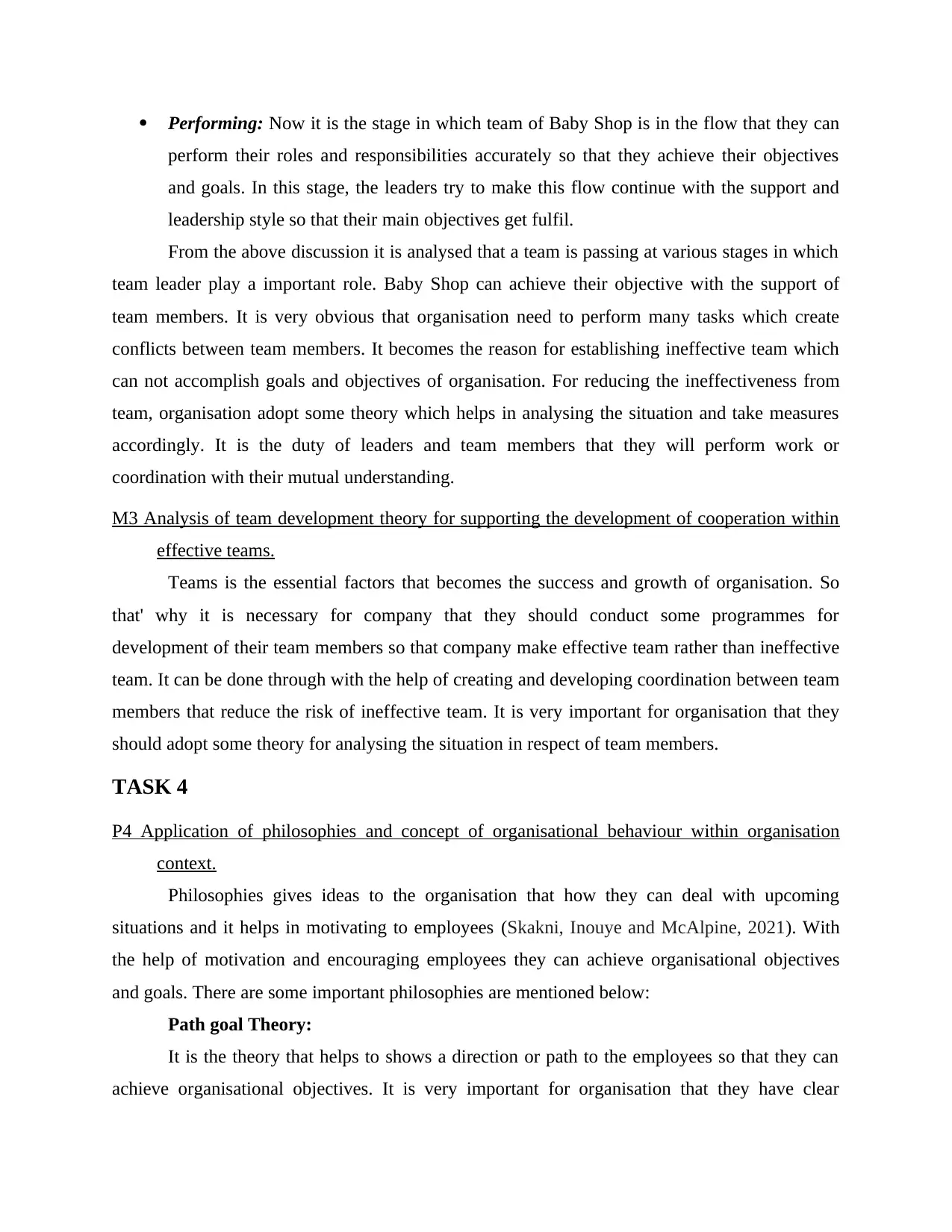
Performing: Now it is the stage in which team of Baby Shop is in the flow that they can
perform their roles and responsibilities accurately so that they achieve their objectives
and goals. In this stage, the leaders try to make this flow continue with the support and
leadership style so that their main objectives get fulfil.
From the above discussion it is analysed that a team is passing at various stages in which
team leader play a important role. Baby Shop can achieve their objective with the support of
team members. It is very obvious that organisation need to perform many tasks which create
conflicts between team members. It becomes the reason for establishing ineffective team which
can not accomplish goals and objectives of organisation. For reducing the ineffectiveness from
team, organisation adopt some theory which helps in analysing the situation and take measures
accordingly. It is the duty of leaders and team members that they will perform work or
coordination with their mutual understanding.
M3 Analysis of team development theory for supporting the development of cooperation within
effective teams.
Teams is the essential factors that becomes the success and growth of organisation. So
that' why it is necessary for company that they should conduct some programmes for
development of their team members so that company make effective team rather than ineffective
team. It can be done through with the help of creating and developing coordination between team
members that reduce the risk of ineffective team. It is very important for organisation that they
should adopt some theory for analysing the situation in respect of team members.
TASK 4
P4 Application of philosophies and concept of organisational behaviour within organisation
context.
Philosophies gives ideas to the organisation that how they can deal with upcoming
situations and it helps in motivating to employees (Skakni, Inouye and McAlpine, 2021). With
the help of motivation and encouraging employees they can achieve organisational objectives
and goals. There are some important philosophies are mentioned below:
Path goal Theory:
It is the theory that helps to shows a direction or path to the employees so that they can
achieve organisational objectives. It is very important for organisation that they have clear
perform their roles and responsibilities accurately so that they achieve their objectives
and goals. In this stage, the leaders try to make this flow continue with the support and
leadership style so that their main objectives get fulfil.
From the above discussion it is analysed that a team is passing at various stages in which
team leader play a important role. Baby Shop can achieve their objective with the support of
team members. It is very obvious that organisation need to perform many tasks which create
conflicts between team members. It becomes the reason for establishing ineffective team which
can not accomplish goals and objectives of organisation. For reducing the ineffectiveness from
team, organisation adopt some theory which helps in analysing the situation and take measures
accordingly. It is the duty of leaders and team members that they will perform work or
coordination with their mutual understanding.
M3 Analysis of team development theory for supporting the development of cooperation within
effective teams.
Teams is the essential factors that becomes the success and growth of organisation. So
that' why it is necessary for company that they should conduct some programmes for
development of their team members so that company make effective team rather than ineffective
team. It can be done through with the help of creating and developing coordination between team
members that reduce the risk of ineffective team. It is very important for organisation that they
should adopt some theory for analysing the situation in respect of team members.
TASK 4
P4 Application of philosophies and concept of organisational behaviour within organisation
context.
Philosophies gives ideas to the organisation that how they can deal with upcoming
situations and it helps in motivating to employees (Skakni, Inouye and McAlpine, 2021). With
the help of motivation and encouraging employees they can achieve organisational objectives
and goals. There are some important philosophies are mentioned below:
Path goal Theory:
It is the theory that helps to shows a direction or path to the employees so that they can
achieve organisational objectives. It is very important for organisation that they have clear
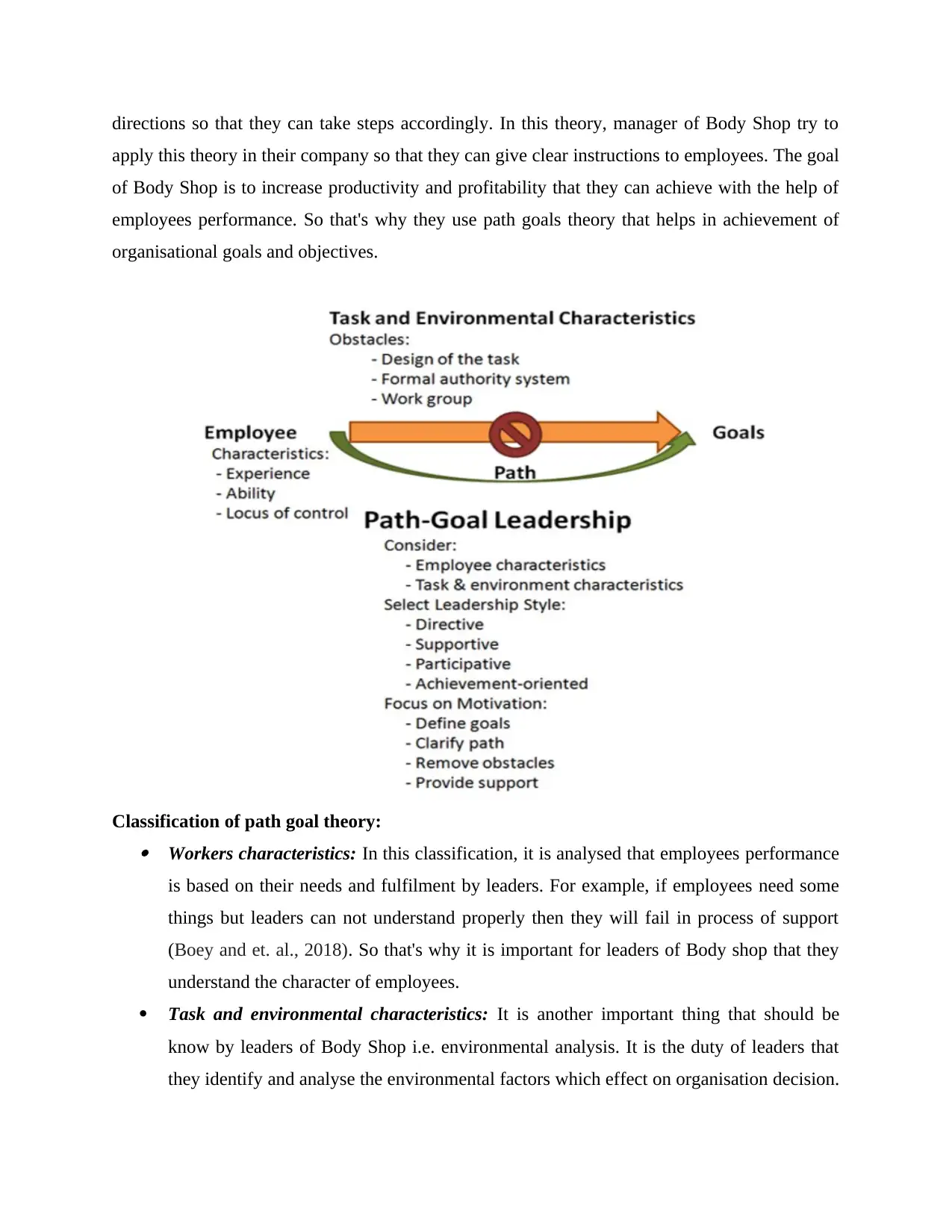
directions so that they can take steps accordingly. In this theory, manager of Body Shop try to
apply this theory in their company so that they can give clear instructions to employees. The goal
of Body Shop is to increase productivity and profitability that they can achieve with the help of
employees performance. So that's why they use path goals theory that helps in achievement of
organisational goals and objectives.
Classification of path goal theory: Workers characteristics: In this classification, it is analysed that employees performance
is based on their needs and fulfilment by leaders. For example, if employees need some
things but leaders can not understand properly then they will fail in process of support
(Boey and et. al., 2018). So that's why it is important for leaders of Body shop that they
understand the character of employees.
Task and environmental characteristics: It is another important thing that should be
know by leaders of Body Shop i.e. environmental analysis. It is the duty of leaders that
they identify and analyse the environmental factors which effect on organisation decision.
apply this theory in their company so that they can give clear instructions to employees. The goal
of Body Shop is to increase productivity and profitability that they can achieve with the help of
employees performance. So that's why they use path goals theory that helps in achievement of
organisational goals and objectives.
Classification of path goal theory: Workers characteristics: In this classification, it is analysed that employees performance
is based on their needs and fulfilment by leaders. For example, if employees need some
things but leaders can not understand properly then they will fail in process of support
(Boey and et. al., 2018). So that's why it is important for leaders of Body shop that they
understand the character of employees.
Task and environmental characteristics: It is another important thing that should be
know by leaders of Body Shop i.e. environmental analysis. It is the duty of leaders that
they identify and analyse the environmental factors which effect on organisation decision.
⊘ This is a preview!⊘
Do you want full access?
Subscribe today to unlock all pages.

Trusted by 1+ million students worldwide
1 out of 15
Related Documents
Your All-in-One AI-Powered Toolkit for Academic Success.
+13062052269
info@desklib.com
Available 24*7 on WhatsApp / Email
![[object Object]](/_next/static/media/star-bottom.7253800d.svg)
Unlock your academic potential
Copyright © 2020–2026 A2Z Services. All Rights Reserved. Developed and managed by ZUCOL.



